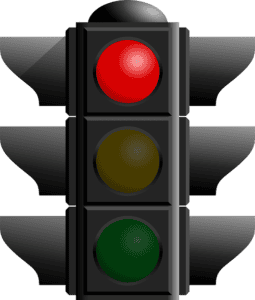
Hi students! Today is the first day of our 5-day mini-course about English words with multiple meanings.
In this mini-course, we’re going to look at 5 VERY common words and learn a total of 100 different ways to use them. This will improve your ability to express yourself in English, because you’ll discover lots of new ways to use some words you already know.
Here’s how the course works: each daily lesson will focus on one word, and I’ll teach you various meanings of that word in English, as well as how it’s used in some expressions and phrasal verbs.
After you watch the video, make sure to do the exercises so that you can review what you’ve learned and put it into practice! Practicing is the key to remembering these words and expressions so that you can actually use them when you speak English.
Multiple meanings of RUN
Today’s word is RUN. This simple word has approximately 645 different definitions and uses – and you might be thinking, “It’s impossible to learn them all!” – you’re right, and it’s not even necessary to memorize all 645 definitions.
You should focus on the most common ones used in daily life – and that’s what I’m going to teach you in today’s lesson. We’ll cover 16 meanings for “run” as well as some common phrasal verbs and idioms.
run = go fast by moving your legs quickly
 The first definition of “run” you already know – to go fast by moving your legs quickly.
The first definition of “run” you already know – to go fast by moving your legs quickly.
So I won’t spend much time on this one except to say that we can show the direction of running with the preposition used after it:
- run away (from) – go away, to increase the distance. The people ran away from the burning building.
- run off – go away from me or from the point of reference. Yesterday I saw a rabbit in my yard, but when I got closer, it ran off. Or I could also say “it ran away” – it’s the same. We also sometimes say run off to (a destination). After finishing their homework, my kids ran off to the playground. They went away from me or away from our house and to the playground.
- run to/towards – the opposite of run away; to decrease the distance. The little boy ran to his mother after he fell down and scraped his knee. The soccer players ran towards the goal.
- run around – run in various directions. My dog barks and runs around the house whenever someone knocks on the door.
- run after – to chase/pursue, to follow someone/something. The dog ran after the cat.
Before continuing, let me also show you a few common collocations when talking about running as a sport – we can:
- “go running” – I like to go running in the early evening.
- “run a distance” – They run two miles every morning.
- “run a race/marathon” – She’s training to run a marathon next month.
run = manage
OK, let’s look at another definition of run, and that is to manage something – usually managing a business, company, a campaign, an operation.
For example:
- He runs an import/export business.
- I don’t like the way the director runs the customer service department.
- We ran a successful advertising campaign during the summer.
If we describe something as well-run, or say it runs smoothly or efficiently, it means it operates and functions well. For example: It was a well-run conference; all the events started on time.
run = operate on a schedule (transportation)
In the area of transportation, we use “run” for operating on a schedule. For example:
- The train runs every hour.
- Bus service stops running at midnight.
- The public transportation in Germany usually runs on time.
If a form of transportation is delayed, we can say it’s “running late.”
You can also use this to talk about people’s schedules, when they are doing things later than the anticipated time. For example, “Can we move the meeting from 4 to 5? I’m running late today.”

run = function
We also use “run” and “running” with machines – especially car engines – as well as computer programs, to mean they are functioning. For example:
- Oh no! I locked the keys in the car with the engine running.
- You should always have antivirus software running on your computer.
run = be a candidate for a political position
In politics, to “run for office” means to be a candidate for a political position.
So if you’re running for president, it means you hope to be elected president. Someone can “run for” any position to which they hope to be elected – run for president (of a country), run for governor (of a state), run for mayor (of a city).
run = flow
When talking about liquids, to run means to flow – for the liquid to move in a certain direction. So you could say:
- The little boy had tears running down his cheeks.
- My nose is running – I need a tissue.
- Who left the faucet running in the kitchen sink?
In some places that are more rural or not very developed, there’s no running water. The expression running water refers to having water easily available in your house, when you simply open a faucet and the water comes out. If there’s no running water, then you would need to bring in water from outside in buckets.

run = stretch or extend
“Run” can also be used in the sense of something stretching or extending from one place to another. So I could say:
- The train tracks run alongside the river.
- She has a tattoo of a sword running down her leg.
run = continue to operate for a time period
The word “run” can also mean “continue to operate for a time period.” For example:
- This internship runs from June to August.
- The river cleanup project ran from 2012 to 2015.
run = do
“Run” can also be used in the sense of “do” – mostly in the expression “run errands,” meaning to do necessary tasks outside the house like going to the supermarket, bank, or post office.
Scientists can also run a test or run an experiment – this is a less formal way to say do a test/experiment.
run = leave (informal)
One informal meaning of “run” is to leave – when someone says “I’ve gotta run” it means “I need to leave” or to I need to go to the next place/commitment on my agenda.
run a fever = body temperature higher than normal
“Run” is also used in a couple different ways in these specific expressions: to run a fever means that your body temperature is higher than normal. Run a fever is essentially the same as have a fever.

run in the family = be consistent among members of a family
If there’s a characteristic or a disease that runs in the family, it means that several people in the same family have this same characteristic or disease.
If a grandmother, mother, and daughter are all artists, you can say that artistic skills run in the family. Or if parents and children both have diabetes, again, that disease runs in the family.
run a red light = pass through a red traffic light instead of stopping
One expression in traffic is to run a red light, which is when a car passes through a red traffic light when they were supposed to stop. This is illegal, and you can get in trouble if the police or a traffic camera catches you running a red light.

run a risk = experience a risk
A very common phrase is when we talk about running a risk – this means you are experiencing a risk, some danger. If you smoke, you run the risk of developing lung cancer.
run (noun) = a quick trip
Those were a whole bunch of ways to use “run” as a verb, but it can also be a noun.
One meaning of “run” as a noun is a quick trip. For example:
- I’m going to make a grocery run – do you need anything?
- The package will be dropped off during the next delivery run.

run (noun) = a sequence of similar events
Finally, a run can be a sequence or series of something – when something keeps happening repeatedly.
Saying you’re having “a run of bad luck” means that unlucky things are happening to you frequently and repeatedly. Or a book might have “a successful run” if it stays on top of the bestseller list for several months.
Those aren’t the only ways to use “run” – there are a lot more – I’ve simply selected the most common ones that are used pretty frequently in daily life.
Phrasal verbs with RUN
But we’re not done yet! The word “run” is also used in several phrasal verbs. Here are five of them:
- If something runs out or if you run out of the item, it means it is all used up and there is no more of it. If you run out of milk at home, then you need to go buy more milk. If you’re taking a test where there’s a 1-hour time limit, and your time runs out, it means the time is finished, and there’s no more time available.
- Describing something as run-down means it is in bad physical condition because it is old and has been used a lot. This is typically used to describe old houses and buildings that are not well-maintained. You can also describe yourself as feeling run down when you are tired and don’t have much energy.
- To run into someone means to encounter that person by chance. You didn’t plan to meet up with them; it was a coincidence. For example, “I ran into my English teacher at the mall.”
- The phrasal verb run over is used for when a car hits and drives over something. For example, “I felt so bad that I ran over a squirrel on my way to work this morning.”
- The last phrasal verb we’ll look at is run through. To run through some information means to quickly look at or present the main points. On airplanes, the flight attendants run through basic safety information before the plane takes off.

Idioms with RUN
In addition to multiple meanings of the word run, and several phrasal verbs, we also have idioms! There are tons of these, and it’s not possible to cover them all in one lesson.
But I’ll teach you a few so that you can just get an idea of the types of expressions where we use the word “run.”
- Two simple ones are in the long run and in the short run – these simply mean “in the long term” and “in the short term,” talking about distant future and near future. “In the long run” is probably more common. For example, maybe you’re going to buy a very expensive mattress. It’s hard to spend a lot of money on it, but you know it’ll be worth it in the long run because it will improve your sleep and help you feel better for a long time.
- Describing something as a home run or saying someone hit a home run means it was very successful. This expression comes from the sport of baseball, where a “home run” describes hitting the baseball out of the park and immediately scoring points; it’s like the best thing you can do in that sport. Now we can use it for any action that’s very successful; for example, maybe you’re learning how to cook and your first few dinners don’t turn out very well, but you hit a home run with your lasagna – meaning the dish came out great; it was successful.

- If something is running rampant, it means it is spreading out of control. Right now, as I’m recording this lesson, unfortunately, coronavirus is running rampant in the United States. We usually use this expression for bad things that are out of control – corruption running rampant in a government, or crime running rampant in a city.
- Our final expression today is to run the gamut, meaning to cover a wide range of things. We usually say something runs the gamut from A to Z. For example, My tastes in music run the gamut from hip hop to country music. Or, Espresso English courses run the gamut from grammar to pronunciation – meaning we cover a wide range of things that are varied.
Practice multiple meanings of RUN
Wow, that was a lot of information!
Now it’s time to practice, and there are two good ways to do that.
One is to download the worksheet that comes with this lesson – you’ll find the link below this video – download the worksheet and do the exercise so that you can review everything.
And another excellent way to practice is to create your own example sentences using the word “run” in various ways – and write them down.
Make these sentences things that are true for you – what’s the last food item you ran out of? I recently ran out of bread at home. What’s a company you think is well-run? Describe a time you hit a home run, you did something very successful.
When you use these expressions in sentences that are personalized, it will help you internalize and remember all the different ways to use “run.”
That’s all for day 1 of this mini-course – I hope you enjoyed the video, and I’ll talk to you tomorrow!
Learn more: 100 synonyms for common words










